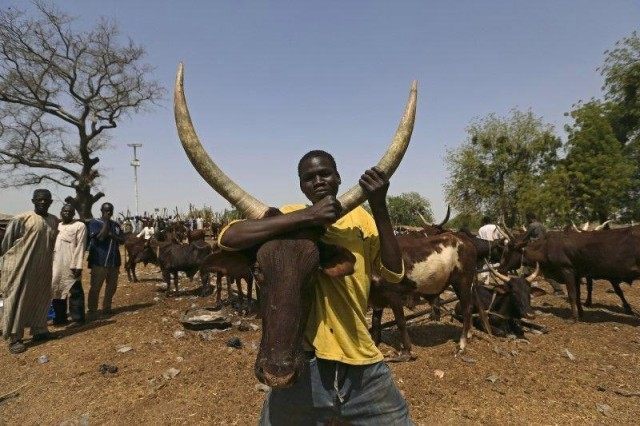The fight against Islamic State affiliate Boko Haram has forced many Nigerians to shut down their businesses, causing them to lose money and their livelihoods.
The Nigerian army recently shut down the Maiduguri cattle market, which left “hundreds of cattle traders, herdsmen, butchers and laborers unemployed.”
“We are suffering,” said cattle herdsman Usama Malla. People around him demanded compensation.
Those displaced by Boko Haram found necessary employment at the market. From Reuters:
Officials say they were forced to shut the market because Boko Haram has resorted to stealing cattle from villagers to feed its fighters and raise funds after the army pushed it out of cities. Cattle looting has displaced its previous sources of income: robbing banks and kidnapping wealthy people.
The market closure has disrupted beef supplies in Maiduguri and the rest of Borno state, adding to the hardship of people who have long complained of poverty and neglect in the north, struggles that prompted some to join Boko Haram’s revolt.
Governor Kashim Shettima said officials need to “identify sellers” before anyone buys cattle.
“There were suspicious persons who sold cattle which they had bought from Boko Haram,” he explained. “This is financing the terrorists.”
In the past five years, Boko Haram has displaced almost two million people. The American University of Nigeria took in 270,000 people, but does not have the resources to help everyone.
In January 2015, the United Nations Children’s Fund (UNICEF) released these stats about the exodus to neighboring countries:
Nearly one million people have fled their homes in Nigeria because of the violence rocking the northern parts of the country, while more than 135,000 have sought refuge in Cameroun, Chad and Niger.
The recent attacks on Baga have led to a fresh wave of refugees into neighbouring countries, leading to a larger humanitarian crisis in the region – the vast majority are women and children.
In Chad, about than 9,000 Nigerian refugees and Chadian returnees have arrived to Chad since the beginning of the month, bringing the total number of Nigerian refugees there to over 10,000. More than 100 children have arrived without a parent or a caretaker.
In Cameroun, children represent 60 per cent of the 25,000 Nigerian refugees living in Minawao camp, in the northern region, where a recent assessment revealed alarming rate of malnutrition among children.
Niger has seen a sharp increase in the number of people seeking refuge in the Diffa region, where women and children make up 70 per cent of the 100,000 Nigerian refugees and returnees.
The government has encouraged people to return home since the military has “technically defeated” the group. But people worry about their safety and think the terrorist group still poses a risk.
“From a protection standpoint, I’m really concerned about possible coerced relocation out of Maiduguri into the rest of Borno,” stated Sarah Ndikumana, Nigeria director of the International Rescue Committee.
She added: “They’ll be heading back to their homes that have been destroyed, but the humanitarian community will not be able to go with them and provide assistance because we can’t consider it safe enough.”
Sule Mele, executive director of the Board of the Borno Emergency Management Agency, said 450 children, between one and five-years-old, died in the IDP camps in 2015 across Borno state.
“Poor feeding practices, such as inadequate breastfeeding, offering the wrong foods and not ensuring that the child gets enough nutritious food also contribute to malnutrition,” he said, adding:
The food that is mostly served in the camps is always adults in nature which affect the health, growth and physical development of the children. Even if the children get enough to eat, they will become malnourished if the food they eat does not provide the proper amounts of micro-nutrients, vitamins and minerals to meet daily nutritional requirements. The children should at least be fed with an enriched groundnut pap, crayfish, periwinkles, millet, soya beans, moi-moi, fishes, pap, ugba and a whole lot of others. The effects of inadequate nutrition and malnutrition include stunting and recurrent infections or chronic diseases.
He wants the Nigerian government “to adopt the U.S. Special Supplemental Nutrition Programme for Women, Infants and Children (WIC)” to help provide proper nutrition for the children.
“Poor nutrition in terms of foods and feeding behaviours, especially during the first two years of life can lead to low immunity, significant illness, late development and death,” he concluded.

COMMENTS
Please let us know if you're having issues with commenting.